When the Royal Navy appears in the news, the phrase most often chosen by ourselves and other outlets is “a British warship”.
On the surface it is a simple description. In reality, it carries centuries of history and a sense of national identity that far outweighs its brevity.
The Royal Navy’s role in Britain’s story is difficult to overstate. Its victories and disasters have been milestones in the country’s history, from the Armada in 1588 through to the Falklands in 1982. Trafalgar in 1805 became a cultural symbol, with Nelson elevated to myth. The North Atlantic convoys of the Second World War, guarded by corvettes and destroyers in bitter conditions, are still remembered as moments when Britain’s survival rested on ships at sea.
Because of this heritage, the phrase “British warship” is never neutral. It summons memories of battles fought and seas controlled, even if the vessel in question is a modern frigate on a routine patrol. During both world wars newspapers constantly leaned on the phrase to describe naval clashes. It made events sound familiar and reassuring at a time of uncertainty, even when the individual ships involved were new designs. The Falklands brought it back into heavy use, with headlines describing British warships fighting Argentine aircraft and steaming into danger.
The words have power because they speak to a wider audience than naval specialists. Naming a specific frigate or destroyer requires readers to know something about classes and hull numbers. Saying “British warship†allows anyone to grasp the significance immediately. It is Britain on the move, Britain under threat, or Britain standing firm, depending on the context.

Governments know this. Official statements often favour the phrase when they want to emphasise presence and resolve. Announcing that a British warship has entered the Red Sea or escorted merchant vessels through the Gulf is more impactful than a dry reference to HMS Specfic. The choice of words clearly project centuries of tradition.
Journalists adopt the same approach, readers will know we do this heavily. ‘British warship monitors Russian jets’ is a headline with drama and immediacy whilst reference to a particular ship type lacks the same punch. This framing encourages readers to view naval operations as part of a national story rather than as a technical exercise in maritime security.
The effect is not trivial. Language shapes perception. When every deployment is cast as “a British warship” carrying out a task, the public is encouraged to see naval capability as an act of presence, even when the underlying task may be routine escort or training. The wording amplifies the sense of Britain as a country still defined by its ability to put steel at sea.
Abroad the resonance is different. Russian and Chinese media often seize on the phrase, highlighting the presence of “British warships†in contested waters as proof of interference. Iranian outlets do the same when reporting on the Gulf. For them, the words are useful too, conjuring an image of Britain acting as a spoiler or clinging to influence.
This is why “British warship†endures in both government communications and media reporting. It condenses centuries of naval history into two words. Each time it appears, it ties the present to the past and signals something larger than a ship.
The term, for us at least, is not going away. It is too useful, too evocative, too deeply bound up with the national story. But it is worth remembering how much is smuggled into those words, and how far the phrase can shape our perception of events at sea.


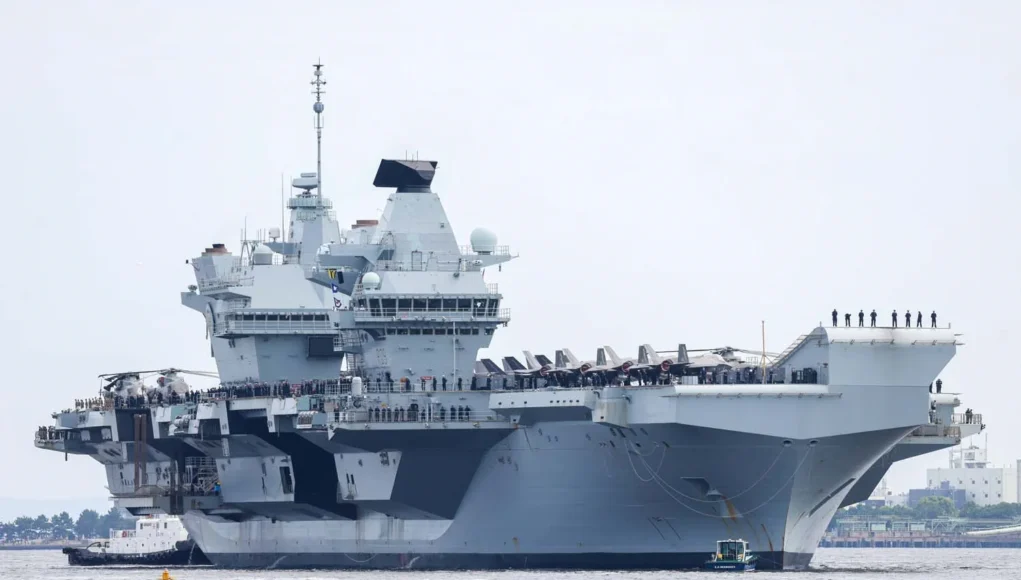

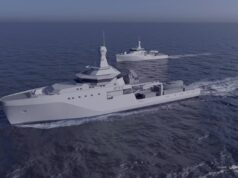
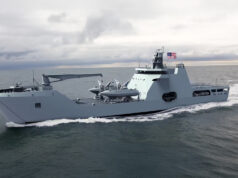
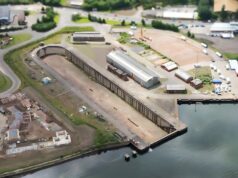

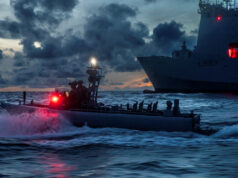

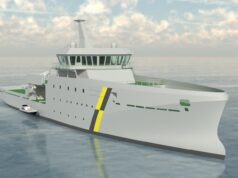

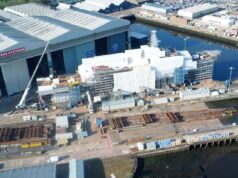

Nice piece George, thanks.
Yes, nice article. But I wonder if it is the word ‘warship’ that is the evocative bit, not so much ‘British’.
Try this exercise. “Massive Russian warship transits English Channelâ€. “US warship sinks Iranian vesselsâ€. “Argentine warship circling the Falklandsâ€. “Chinese warship approaching Faslane at high speed.â€
Evocative?
I’d say its those two words together, not “British [NavalVessel]” or “[CountryName] Warship” but “British Warship” that is the evocative part.
“Massive Russian warship transits English Channel†. . Spotted miles away due to smoke plume and broke down in the middle.
“US warship sinks Iranian vessels” . . That’s a Tuesday isn’t it 🙂
“Argentine warship circling the Falklands†. Spearfish (or maybe an old Mk8) & Good Night.
“Chinese warship approaching Faslane at high speed.†. . Spearfish & Good Night.
Fair enough, but the last two require a ‘British nuclear hunter-killer submarine’ to actually be seaworthy!🤣
And look what successive governments have done to our Royal Navy.
I think British nuclear hunter-killler submarine is a little more evocative, and fearsome!
Only if we actually have some at sea!
If only we had space on the Paper!
What about British gunboat
Britisg gunboat speaks more of colonial times (say more than 100 years ago).
British Warship should speak more of freedom of the sea. Protecting the weak from bullies. Deterring aggression.
Indeed, I was being facetious
The trouble is that once the empire came to an end, the RN, which was crucial to protecting the empire and the trade routes that connected it, lost much of the role it had held for over 200 years. Understandably attached to its dominant past, the RN failed to think radically about what it should be in the post imperial world. It clung on to the idea of global deployment and tried to keep up with the US navy, in quality if no longer quantity. The inevitable result was a slow but inexorable shrinking, exacerbated by the growing cost of new equipment.
So we have two huge aircraft carriers but insufficient money to buy and support the aircraft they were designed to deploy. Nor do we have sufficient escorts to protect them or supply ships to sustain them at distance.
We have an expensive fleet of SSNs that have been largely inactive because of failure to plan and fund their maintenance.
There needs to be much greater clarity on what we need the RN to do and what we don’t. We have to escape the mental prison of a now irrelevant past.
You’d be amazed at how tiny RN’s budget actually is.
This has everything to do with ever shrinking budgets after years of inadequate budgets and capital programs pushed to the right so everything is falling apart and soaking huge amounts of cash and effort to keep running….
Peter,
I couldn’t agree more.
The reality however is that the UK government should be standing up and accepting that funding defence (that is, ALL arms – Navy, Airforce, and Army) requires money, and should be as important as funding social services.
It seems to me that the issues you raised in your final paragraph sum it all up completely, and (one assumes Treasury) bureaucrats seem not to understand that delaying projects to save money in one budget inevitably increases (and further delays, etc etc) the amount need in the next, or, more likely, subsequent budgets down the line. And in the interim, (as far as the Royal Navy is concerned), the cost of maintenance, and the deteroration of effectiveness of the few ships and boats left in the fleet, mean that the meagre amoiunt of money available is essentially worthless.
Rolls Royce choices on a Mini budget have left us with the current hollowed out force. The post 1990 peace dividend reduction in defence spending meant a drop in numbers was inevitable. But unrealistic choices have made a bad situation worse- stretching budgets to and beyond the limit- with all the consequent short term saving measures causing real damage to programmes and capabilities.
Worryingly, discussions about the future MRSS seem to be repeating the mistakes of the past with some options likely to be so expensive that once again, numbers will fall.
I would like to see defence as the top priority for public spending, but only if it is well managed .
Personally, I would like at least two things to change. The first is that defence is recognized as a cross party strategy as its a national decision, not just a political football, where the allocated funding can be cut and used instead for gesture projects by the in government party. This would mean that all the MPs have to make a decision on defence and say a 10 year plan is agreed. Secondly I would like if the above doesn’t happen, that Defence Select Committee to get more political clout in bringing both the in-party government and MOD to account. As at the moment when questioned, the Government and MoD can just use spin to avoid the awkward questions.
In fairness, the RN did think very radically about it’s role after the need for a global navy passed, and it was withdrawn from “East of Suez”. That’s why during the Cold War it became the world best subhunting force with a massive north atlantic focus.
A good post but I do disagree about your assessment of the post war RN, which was very innovative adopting new technologies, jets, gas turbines, helicopters, nuclear submarines and guided missiles whilst also lumbered with our imperial legacy and the challenge of the Soviet Union.
Other than the immediate post 1945 wish to remain a global player the RN soon took a more practical approach and evolved forces to reflect the economic situation of the country. Vanguard to Trident by Eric Grove is a really good piece about this entire period.
I would argue that up to the end of the 20th century when much of our political and military leaders had wartime experience the RN was very well led so in this period we dodged Vietnam despite generally supporting the US in the Cold War but undertook numerous successful operations across the globe culminating in the First Gulf War.
It was then as the century closed and that first hand understanding of conflict was lost that real missteps became common place; Iraq, Afghanistan, Libya and nearly Syria. During this later period we have been led by the Oxbridge educated PPE brigade whose understanding of history seems to be nil. We are not so much trapped in our irrelevant past but the absolute opposite, which is we have forgotten our history. How else can you explain our intervention in Afghanistan.
The current carriers would have been £1Bn cheaper if Labour had not slowed the build and our core defence requirements such as escorts, subs, replenishment ships, tanks, helicopters etc could have been adequately funded if we had not wasted tens of Billions of pounds fighting wars of no strategic relevance to the U.K.
Those who fail to understand and learn from history are indeed doomed to repeat the mistakes of the past.
Back in the 1980’s when I was an RO(T) – radio operator tactical – on frigates and MCMVs – I would preface broadcasts on VHF Channel 16 with “This is British warship ….” I don’t recollect ever using the term “British naval ship”.
Woool Bwitannia…Bwitannia woools the waves. Jingoistic fluff.
There’s something stuck in your teeth!
🙂
Anything which promotes our nations history and informs people of why Britain is still important is good news. Well done George now let’s get the RN ( naval service )in the faces of the youngster we need to recruit
British *Warships* sounds better.
More british warships please. 🇬🇧🇬🇧🇬🇧🇬🇧ðŸ´ó §ó ¢ó ¥ó ®ó §ó ¿ðŸ´ó §ó ¢ó ¥ó ®ó §ó ¿ðŸ´ó §ó ¢ó ¥ó ®ó §ó ¿ðŸ´ó §ó ¢ó ¥ó ®ó §ó ¿
George Allison, Hi I have never spooken to directly but as you know I do comment. So here goes. British warship is a fairly new thing it has been mostly English warship. In fact when you go overseas many peaople say your English, I am or was tierd of explaning I am half Welsh and half Scottish. Even then not really because I had to explain North Wales/ South Wales devide I’m from the North and the East West devide in Scotland. Grandad from Dundee thought EEh about Glasgow. Don’t let me get on about Cameronian/Cambell issue, I’m Cameronian of Eracht you see the issue.
What you might not understand or know is even at this moment I write to naval historical journals and completing my PhD in the subject most of me books will say English Warship. It is the issue where most people do not understand that the uk is made up of many nations and many cultures.
However, the UK is not the only nation to have this issue, how many people in the UK say Holland, not understanding that the Low countries is made up of 7 diffrent mini nations, you have Zeeland, Friesland, Utrecht, Holland, Gelderland, Overijssel, Groningen these make up the current Republic of the Seven United Netherlands and Belgium. So when you say to a Nederlander you from Holland they get a bit irate. When you look at their naval history it will not be the first time that a Hollander Admiral gave a command to a Zellander in the Anglo Dutch wars and the Zeelander just went Na.
There is also one other issue the Royal Navy is not the British Navy, it is not a Navy to any UK government it is the Royal Navy by law it belongs to the King or Queen, it is formed by Royal perogative not by govermental decree. Whilst some say King Alfred is the father of the RN, Clowes starts his seven volume work form that time I place the birth of the NR ( Navy Royal) with Henry VIII. So English is the correct historical term; Scotland, Wales, Ireland never signed up to it.
The RN has some quircks for example joining the RN you do not take the oath of allegiance, the press gang in theory is still possible, the King or Queen can say to government not with my ships you don’t. The Army, RAF, RFA is a government service the RN is the service of the King or Queen.
So are the RN ships of the UK British; not unless the King or Queen give the yes to government which is British
Indeed, Nelson said ‘England expects’ not Britain expects 🙂
A great man. They replaced his portrait in parliament with Yvette Cooper’s. She can’t even stop a dinghy. 🤣
I don’t know. The govt are pretty good at going about 🙂
Nice jibe.
..and here in South Africa it should not be forgotten that one of Mandela’s first names was Nelson!
George showing his Scottish roots. It’s been spoken of before but we have some brilliant historical names: victory, revenge, warspite etc. maybe we say British after there has been an engagement or derring do??? We do have a proud naval history, personally we do not need to over advertise.
George showing his Scottish roots. It’s been spoken of before but we have some brilliant historical names: victory, revenge, warspite etc. maybe we say British after there has been an engagement or derring do??? We do have a proud naval history, personally we do not need to over advertise.
Hi George and Ron,
Very interesting and enjoyable posts, thank you both
On the face of it Ron makes a very different point to the one George is making. The interesting thing is that they are both equally valid because speak to and of different perspectives, the specialist and the causal observer. George sums this up when he says,”The words have power because they speak to a wider audience than naval specialists.”
The other ting that strikes me is that the point is George making can and does speak of the power of words to rouse people to a certain emotion or response, whereas Ron’s words speak to a reality and history that can be very different and far more nuanced than the casual perception suggests and yet still a powerfully presence in the world today.
I recently re-read Waterloo by Bernard Cornwell (the history of the battle not the Sharp novel). Towards the end of the book he recounts a story about of modern day professor who, having just completed a lecture on the battle, was asked what was the impact of the battle. The professor paused and then answered, ‘it is too early to tell’. History is the road on which we travel, but it is a road into the unknown.
Thank you both, CR
I recall “it’s too early to tell” was the phrase used by the PRC Foreign Minister, Cho en Lai [pardon my spelling] , who responded, when asked the question in the late 20th century “Was the French Revolution successful?”.
A good line for a hack writer to plagiarise.
To be fair Roger, “it’s too early to tell” makes a great answer to may a question…
Cheers CR
Interestingly that is actually an urban legend, Zhou Enlai was actually answering a question from Richard Nixon in a conversation they had during his 1972 visit to china. The conversation was actually about the “French May†the set of general strikes and civil unrest in the summer of 1968 in France that lead to the fall of the de Gaulle a year later in 1969 and a profound change in French social policy that reflected all across Europe.. so they were talking about an even that we still changing the social fabric of France and wider European social policy,
There is no published evidence that the question was about the 1968 French “civil unrest”. All that “unrest” was just some trade unionists participating in the French tradition of going on strike and rioting, plus a few scruffy students, who later became bourgeois fat cats, being thumped and tear gassed by the CRS. And Nixon would have known all that. As for French social policy changes being reflected all over Europe – give me a break – it made sod all difference, particularly in the UK.
The most important European event that year was what happened in Czechoslovakia, another demonstration of Russian thuggery.
Sorry but there is plenty of public and published evidence that Zhou Enlai was talking about the may 68 event. It’s part Chinese record of the events and the record made by the Chinese interpreter was clear that was what Zhou was referring to. As fo May 68 not being important most historians would call you out on that.. at its hight 10 million citizens were involved and it essentially stopped the nation working, it was very close to becoming an open revolt. One key French historian ( sorry forgot his name) called it the most important event in French history since 1945. And it did impact across Europe.. you may not be aware of it but the rise, tactics and actions of the far left movements in the UK during the 1970s was taken from and influenced by May1968.
OK Perhaps he was chatting about the 1968 events, although I would take any information from ChiCom sources with a big pinch of salt.
As for the influence on the British left; well, the relatively small and pathetic far left groups in the UK may, when they were not stoned, have got a cheap thrill from thinking they had something in common with the French. The more influential mainstream left groups were more directly influenced by, as usual, British Christian socialists, the British trade union movement, the US Civil Rights movement and the Civil Rights/PIRA movement in NI.
Maybe the biggest French thing since 1945 was their surrender at Dien Bien Phu.
Ron- you have touched a topic, or more to the point, a nerve near to my heart! When will our American cousins cease to talk of ENGLANDS King Charles or ENGLANDS Prime minister or refer to the Union Jack as Englands flag? The answer to this rhetorical question is it would seem, NEVER! If I were PM one of my first acts would be to make a pointed public address to our Yank and other friends to correct these simple but really irksome mistakes once and for all!. OK, I would concede that England in terms of its geographic size and share of the population might warrant some prominence in the Union, but nobody refers to the USA as California or Texas tor example, so why idoes this England thing when it should be Britain or even more so,the UK persist??
Rant over.
btw I am a British mongrel like yoursel and indeed most of the Brit population-born in London of Scots-Irish parents plus a touch of Griffiths!
PS You forgot Russia when it should have been Soviet during the USSR-only Putin it seems, did not and still does not understand the difference.
Regards from Durban where the Empire lives on it little remnants!
To be fair people to call the USA America and its citizens Americans.. just imagine how much that could piss of Canadians or Mexicans.. essentially the USA claimed the whole continent…
Fair point Jonathan, but I don’t think either the Canadians or Mexicans are particularly attached to the geographic American tag, particularly since Trumps recent actions against both nations and the Gulf of America story!!
Cheers
PS-Jonathan-I was surprised to see that the UK lies 7th in actual ownership as opposed to Flags of convenience in the Top ten of the worlds Merchant fleets. Also there is a sizeable chunk in 2 British overseas territories-Bermuda and Cayman
I don’t know why but this: “Saying “British warship†allows anyone to grasp the significance immediately. It is Britain on the move, Britain under threat, or Britain standing firm, depending on the context.” Gave me chills, and I can’t wait to see this hidden power rise when the headlines say “First British Type 26 Warship commissioned”
Never thought about it like that, nice one George ðŸ‘
As there are so few, and even fewer fit for service? I respectfully suggest the formation of a “Dinghy Naval Militia”. These, and their mercenary crews could be deployed globally. The sheer numbers alone would stop the Chinese in their tracks, make Iran and Russia quake. All in all a perfect solution, mass with a global reach. Bonus? Hotel vacancies at home for your hols.
Hopefully the historical reputation still carries some weight. Considerable damage has been done by the ridiculously lightweight OPV’s being used to show the flag. The sooner they are relegated to duties more related to their classification (Offshore Patrol Vessels) the less reputational diminution will then occur. The current cry of Protect the Channel would make them ideal for that task. Using them as the Falklands Islands guardship and the Caribbean anti-drug patrol ship with the inability to permanently house a helicopter is not a good image for the Royal Navy. I would suggest we need to get the first of the Type 31’s (Venturer) out into the Mediterranean a.s.a.p. to show the flag – at least it will look like a warship.
…showing the flag is literally what OPV’s are for. Also I don’t think it has done any reputational damage.
Unfortunately the OPVs are not exactly equipped to fight – flag waving does not outrank the prime role of a warship which potentially is to fight.
Great article George! For me, your sentiments are summed up in a song from a South African pop group of some decades back that wrote a number entitled the Bucaneer(McCully workshop). The one verse that made me feel great pride in the concept of “British Warship” was-
But the Royal Navy Frigate came and rescued me at last-She put one across the bow and fired one into the mast!
Rule Brittania!
Sadly I don’t think “ British warship†is that evocative to the British public anymore. As a nation we have lost our maritime hunger and have become sea blind. Personally I think most people now hold the army as a greater barometer of British power, I’m not saying they are correct, but your average punter down the pub will know that we now have the smallest army since the napoleonic period and firmly believe we need more squaddies. What they will not a the foggiest about is the collapse of the maritime triad in the UK and its impact on our global standing… they may mutter about white elephant carriers taking money from the army or the French steeling fishing quotas and that its it… but they will not have a foggy or care about.
1) port and shipping capability: the loss of British port and merchant shipbuilding capabilities or the fact china now owns 10% of European port capacity owns 100 ports across the globe and with Chinese costal port capacity at around 18 billion tones compared to the Uks .4 billion tones, china now builds 51% of the worlds ships, owns and operates 20% of the worlds ships and builds about 97% of the worlds shipping containers.. with the UK shar of global shipbuilding at 2% and owns and operates .5% of the worlds tonnage of shipping
2) naval power: the RN now has around 13 major surface combatants and sends patrol ships in the place of frigates and that china launches the same total tonnage of warships the RN and RFA every 2-3 years..
3) awareness of opportunities and risk: The Uk no longer has the will to exploit even its own EEZs and is essentially turning its back on exploiting the sea, it’s estimated that the UK EEZ contains around 2-3 trillion pounds, yet over the last 25 years we have locked over 25% of it away in protected conservation areas and have only bothered mapping about 25% or it.
Essentially the UK which is a nation of islands scattered across the globe and was the definitive maritime power for 200 years has become profoundly sea blind and has failed in all three key pillars of Martime..
So I no longer believe the idea of a British warship resonates with the British public.. I think an armoured brigade in Poland or the Baltics resonates more than a CBG in the pacific,
A frightening summary Jonathan!
A thought provoking article, the term still does resonate. The country has such a long and proud maritime history to back it up.
For me, it’s the names of the ships that are without peer, and possess a supreme confidence: Powerful, Colossus, Revenge, Indomitable, Illustrious, Conqueror, Thunderer, Victorious, Invincible, Victory, Glorious, Courageous, Neptune, Furious, Agincourt, Iron Duke, Indefatigable, Lion, Mars, Terrible, Canopus, Resolution, Inflexible, Glowworm.
You know what I mean about that last one.